Explore Top Citizenship Investment Programs: Your Gateway to Global Opportunities
- Key Takeaways
- Exploring Citizenship by Investment: A Path to Global Mobility
- Navigating the World of Citizenship Programs
- Investment Routes to a Second Passport
- Financial Perks of Economic Citizenship
- Who Qualifies for Citizenship by Investment?
- Family Inclusion in Citizenship Applications
- Selecting the Right Citizenship Program
- The Best Citizenship by Investment Programs for 2024
- Legal Considerations and International Law
- Summary
- Frequently Asked Questions
Are you considering an investment that transcends borders and opens up a new spectrum of global freedom? Citizenship investment programs are your gateway to enhanced travel ease and business reach. This article sheds light on the value, requirements, and strategic insights into obtaining a second passport through investment, ensuring you’re equipped to make a move that aligns with your international objectives.
Key Takeaways
- Citizenship by Investment (CBI) offers a legal route to acquire a second citizenship through significant financial contribution, providing benefits such as visa-free travel, enhanced global mobility, and access to business and lifestyle opportunities.
- CBI programs vary in investment options and minimum requirements; Caribbean programs like those of Grenada and St. Lucia are noted for their cost-effectiveness, while European programs like Malta’s offer access to the EU and substantial global travel freedom.
- The process of acquiring second citizenship involves due diligence, legal checks, and eligibility requirements, and can extend benefits to family members, offering them improved education, healthcare, and increased stability.
Exploring Citizenship by Investment: A Path to Global Mobility
Often, the idea of citizenship is tied to the place of our birth or our ancestry. But what if citizenship could also be a strategic choice, a deliberate move to enhance our life and open up a world of opportunities? This is the essence of Citizenship by Investment (CBI) programs – a legal pathway that allows individuals to acquire a second citizenship by making a significant financial contribution to a country.
So, what makes these programs so attractive? Imagine being able to:
- Travel visa-free or with visa-on-arrival access to major business and travel destinations
- Enjoy enhanced global mobility as a beneficiary of CBI from countries such as St. Lucia, St. Kitts & Nevis, Grenada, Malta, Antigua & Barbuda, and Dominica
- Take advantage of the diversity and flexibility of the investment options available in these programs
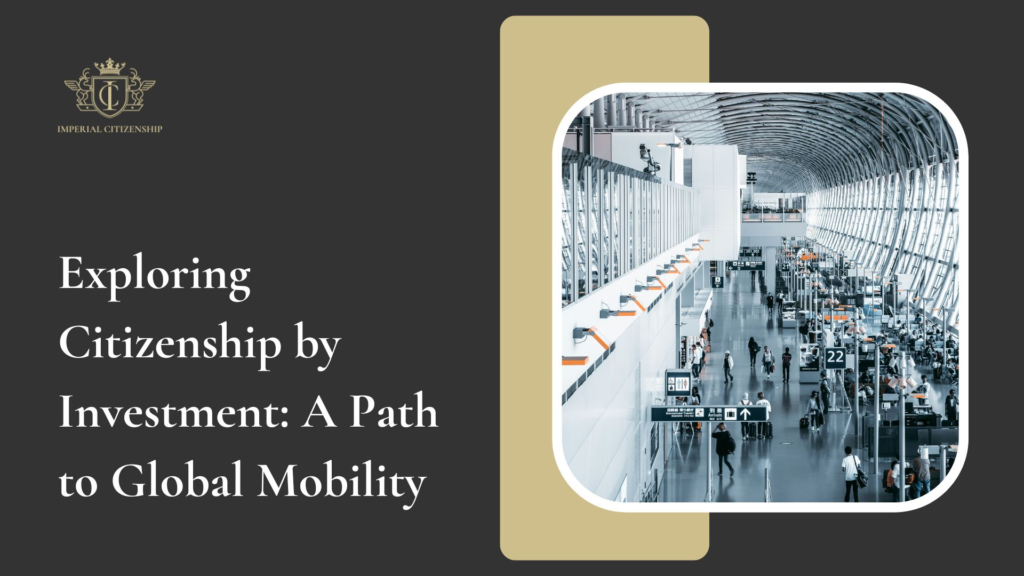
The world is truly your oyster when you have a second passport in hand!
However, be aware, not every CBI program is created equal. They are assessed based on factors like:
- the quality of the passport in terms of visa-free access
- the country’s reputation
- the diversity and flexibility of the investment options available to potential applicants
Navigating this landscape and choosing the program that aligns with your goals can be challenging. Here’s how to go about it.
Defining Citizenship by Investment
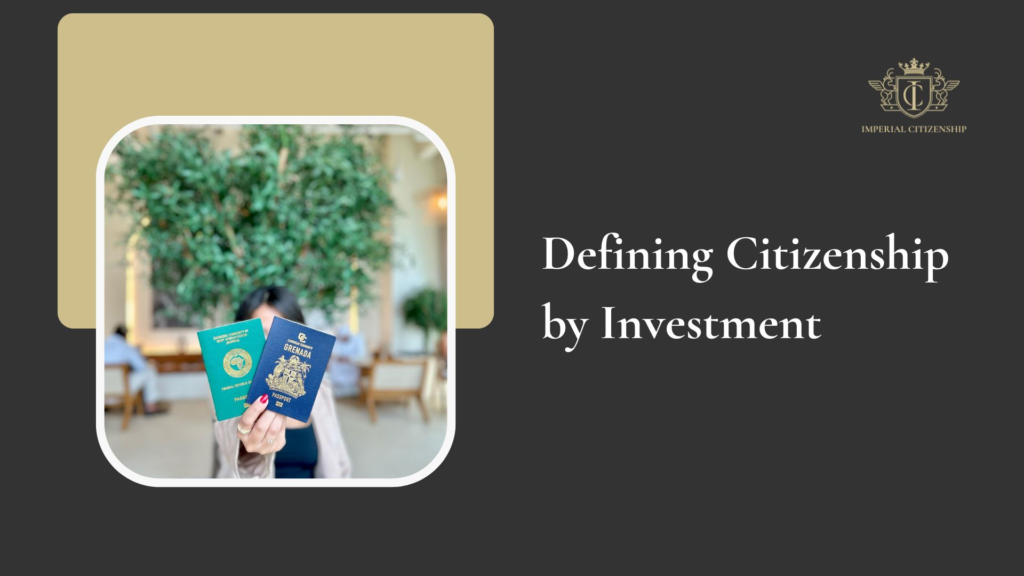
Citizenship by Investment (CBI) is a program where individuals can gain citizenship by making a significant financial contribution. In essence, it is a legal process where foreign nationals can obtain citizenship of a country by contributing economically. This contribution can take various forms, including direct financial contributions to the government, real estate investments, or business ventures.
These programs are legally facilitated by the countries offering the passport and in most cases, do not require the applicant to renounce their original nationality. The financial contributions differ from one program to another, and the countries offering these programs usually set a minimum investment requirement. This investment can be directed towards real estate, business ventures, or government bonds.
The Appeal of Dual Citizenship
Dual citizenship provides numerous advantages, including:
- Significantly increasing an individual’s travel freedom
- Expanding business opportunities
- Offering lifestyle perks that can enhance the overall quality of life for investors
For example, European citizenship by investment programs offer more than just travel convenience.
Furthermore, individuals from countries grappling with economic and safety issues often seek dual citizenship as a pathway to a stable and prosperous future for themselves and their progeny. Whether it’s about access to better healthcare, education, or business opportunities, having a second passport opens doors that might otherwise remain closed.
Navigating the World of Citizenship Programs
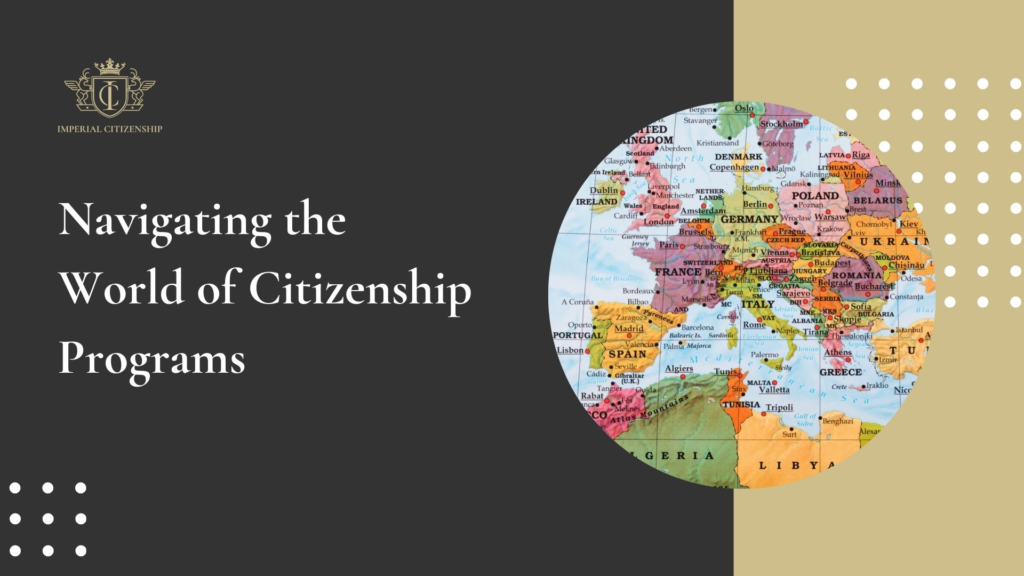
If you’re contemplating acquiring a second passport, the world is indeed at your doorstep. From the picturesque Caribbean islands to the culturally rich European nations, several countries offer direct citizenship by investment programs that meet international due diligence standards. Not only do these countries offer a slice of paradise, but they also provide opportunities for international living, investment, and access to new markets.
Consider the European Union, for instance. Countries like Spain, Greece, Portugal, and Malta provide a pathway to citizenship after a period of residency. The Greece Golden Visa Program, introduced in 2013, is considered a cost-effective residence by investment scheme providing entry to Europe. Successful applicants and their families gain visa-free access to Europe’s Schengen Area after a process lasting about two months.
On the other hand, Caribbean countries like Antigua and Barbuda, Dominica, Grenada, St. Kitts and Nevis, and St. Lucia offer affordable citizenship by investment options with investment thresholds ranging from $100,000 to $250,000, making it accessible to a broader audience. Let’s take a closer look at these programs.
Caribbean Countries Offer a Slice of Paradise
A Caribbean passport doesn’t just offer a slice of paradise; it also provides a gateway to global opportunities. Caribbean nations provide cost-effective citizenship by investment options through programs in:
Their investment thresholds range from $100,000 to $250,000, thus broadening their accessibility.
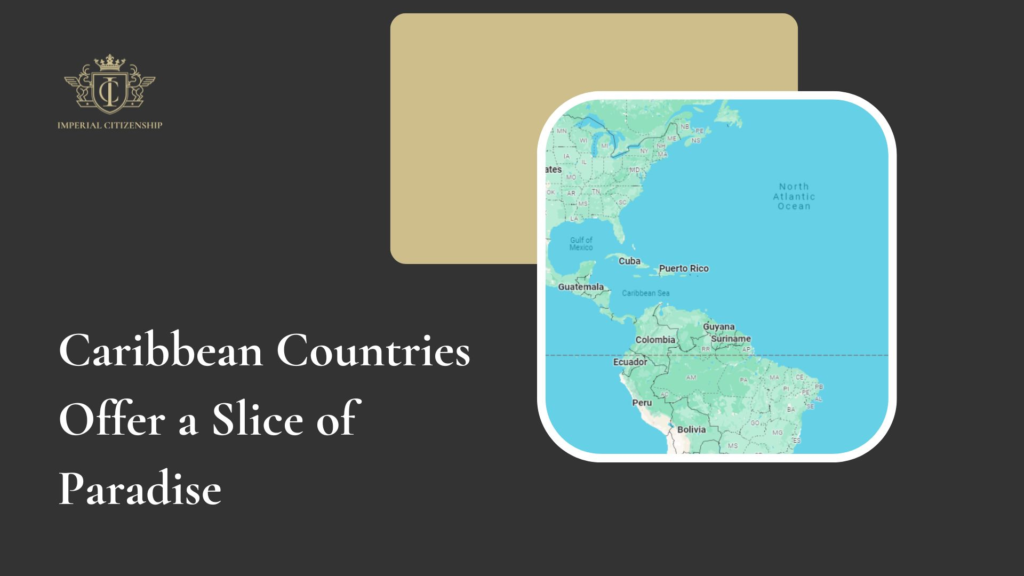
These programs offer substantial visa-free travel benefits. For instance, the Antigua & Barbuda passport allows visa-free access to over 140 countries, and St. Kitts and Nevis ranks 21st in global mobility. Not to mention, the processing times are also favorable, taking about 6-9 months in Antigua & Barbuda.
Obtaining Caribbean citizenship through investment necessitates a non-refundable contribution or an investment in sanctioned real estate development. Applicants can include a spouse, children under 31, siblings under 18, and parents aged 55 and over, as well as add dependents after they have been granted citizenship.
Caribbean nations feature prominently in 2024 for their attractive investment options and flexible relocation terms. If you’re seeking an affordable and attractive citizenship program, you might not need to look further than these Caribbean nations.
European Union’s Golden Ticket

The European Union offers a golden ticket to a life enriched by culture, history, and modern conveniences, making it an attractive destination for those seeking more than just a place to live. European Union passports, particularly through citizenship investment programs like Malta’s, provide significant advantages for global citizens.
Malta’s Citizenship by Investment Program is especially notable for its robust benefits, which include:
- Rigorous Documentation and Investment Requirements: Ensuring only the most serious applicants are considered, Malta’s program requires a significant financial commitment and thorough documentation, enhancing the integrity and exclusivity of its citizenship.
- Stringent but Rewarding Path to EU Citizenship: Known as one of the most stringent yet rewarding pathways to acquiring citizenship, this program is designed for those who are willing to meet high standards in exchange for comprehensive benefits.
- Strong Passport with Global Access: Ranked as the 7th strongest in the world, the Maltese passport allows for visa-free or visa-on-arrival access to numerous countries, underscoring Malta’s powerful global standing.
- Extensive Visa-Free Travel: Holders of a Malta passport enjoy the freedom to travel across the globe without the hassle of obtaining visas for most destinations, providing unparalleled freedom for personal and business travel.
- Opportunities Across the European Union: The Maltese citizenship opens doors not just to residing anywhere within the European Union but also to working, which can significantly enhance professional and personal life opportunities.
These features make Malta’s Citizenship by Investment one of the most appealing for those looking to gain not just a second citizenship but a gateway to the European Union’s myriad of opportunities.
Investment Routes to a Second Passport
After deciding to acquire a second passport, the subsequent step is to select your pathway. Citizenship by investment programs are structured with different investment levels, catering to a wide range of financial capabilities. Some programs might require a direct financial contribution to the government, while others might allow you to invest in real estate or business ventures.
Government bonds or national securities represent one of the commonly accepted investment types for obtaining citizenship through investment. But these are not the only routes. The Caribbean citizenship by investment options include:
- Making donations
- Investing in real estate
- Purchasing government bonds
- Creating business investments
Let’s delve a little deeper into these investment routes.
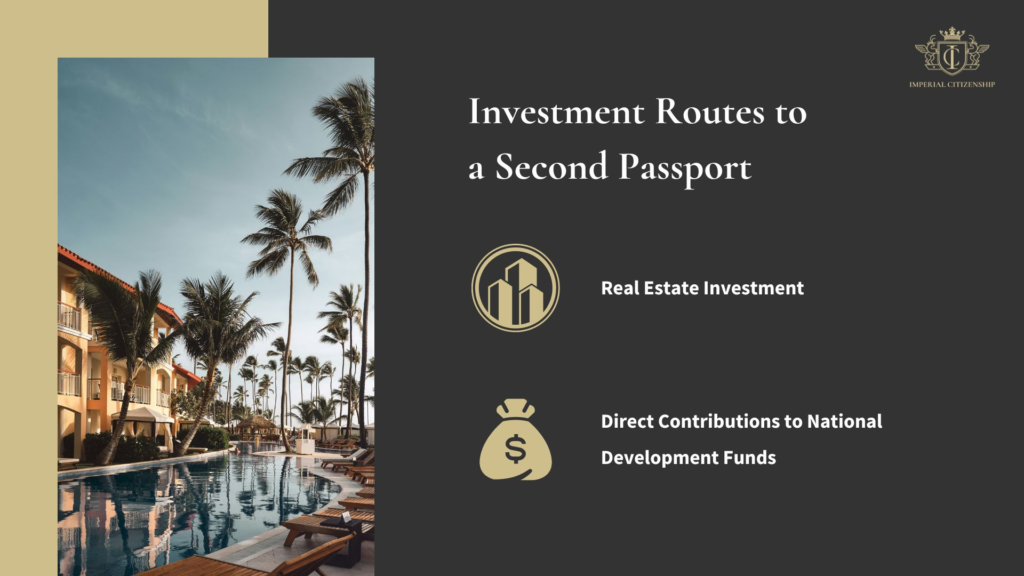
Real Estate Investment: More Than a Home
Considering real estate as an investment goes beyond simply owning a personal residence. It’s a strategic move towards generating income, diversifying your investment portfolio, and building wealth over time. From direct property purchases to joining real estate investment groups, there are multiple strategies to tap into the lucrative potential of the real estate market.
Investing in real estate can serve as a strategic way to generate income, diversify portfolios, and build wealth. However, real estate investing is not without its challenges, including the need for substantial capital, the responsibilities of property management, and market fluctuations. However, with proper research, due diligence, and sometimes the guidance of advisors, real estate can be a powerful component of a balanced investment strategy.
Direct Contributions to National Development Funds
Direct contributions to national development funds offer immediate financial aid to countries providing citizenship by investment programs. Citizenship by donation involves submitting a non-refundable donation to a state fund to meet investment requirements for citizenship.
This direct route to citizenship, through a donation to the National Development Fund or a similar entity, provides immediate financial support to the country. These non-refundable donations require minimum contributions that vary depending on the size of the applicant family. It’s a way of helping the nation grow while securing your own future in the process.
Financial Perks of Economic Citizenship
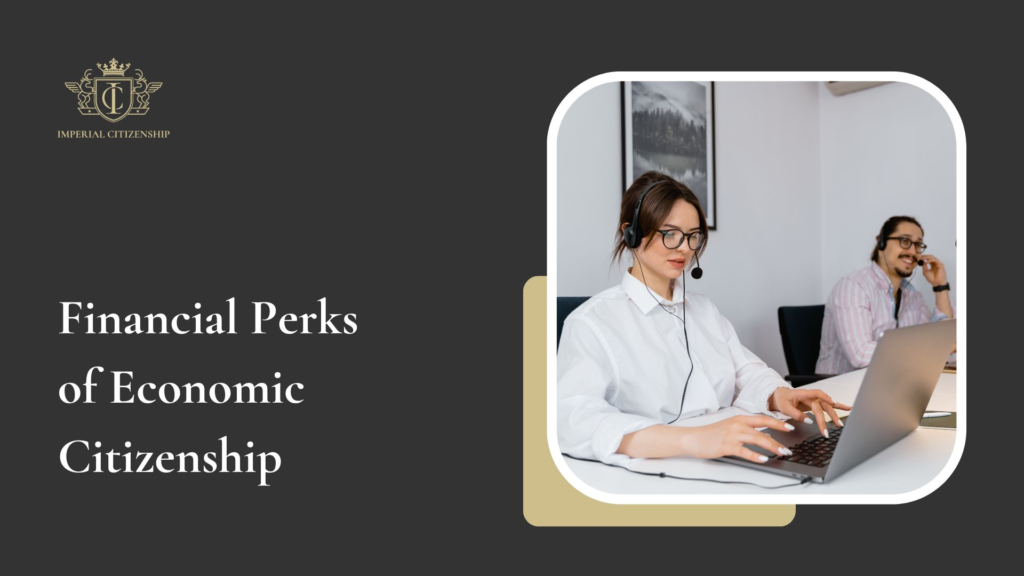
A second passport not only provides access to new countries but also unveils substantial financial benefits. Dual citizenship through investment can bring about considerable tax perks, such as potential exemptions from foreign-earned income tax or benefitting from lower tax rates.
For instance, Dominica’s Citizenship by Investment Program, requiring a minimum investment starting at $100,000, provides significant tax advantages alongside visa-free travel to over 130 countries. Similarly, the St. Kitts & Nevis Citizenship by Investment Program creates a favorable tax scenario for investors by imposing no taxes on personal income, capital gains, or inheritance.
Let’s explore these financial advantages further.
Tax Benefits Across Borders
Dual citizenship offers a plethora of tax benefits that are particularly attractive to individuals with global assets, showcasing how strategic citizenship decisions can influence personal tax liabilities positively. Countries like Malta stand out for their tailored tax regimes, designed specifically to attract foreign investors through their citizenship investment programs.
Here are some notable tax advantages associated with obtaining citizenship in such countries:
- Favorable Tax Conditions: Malta, for instance, offers a compelling tax regime for non-domiciled individuals who obtain citizenship through investment. They benefit from a 15% flat tax rate on income remitted to Malta and total exemptions on foreign-sourced income that is not brought into the country, as well as on foreign-sourced capital gains, even if these are remitted to Malta.
- Tax Reduction Opportunities: These advantageous tax conditions can significantly reduce the overall tax burden on global income and capital gains, making it an attractive proposition for those looking to optimize their financial affairs.
- Enhanced Financial Privacy: Dual citizenship can also provide enhanced privacy for financial affairs, allowing individuals to manage their international assets more discreetly under different jurisdictional rules.
- Asset Diversification: By participating in citizenship by investment programs, individuals can not only diversify their residency but also their investment portfolios, potentially accessing markets and opportunities that offer favorable tax conditions.
- Avoidance of Double Taxation: Many countries with citizenship by investment programs have treaties to avoid double taxation, ensuring that investors don’t pay tax on the same income in two different countries, thus optimizing their tax efficiency.
Such tax regimes are crucial in making countries like Malta prominent choices for investors, blending citizenship benefits with substantial tax advantages to create an appealing package for foreign nationals seeking to enhance their global mobility while optimizing their fiscal responsibilities. These advantages confirm the strategic value of acquiring second citizenship not only as a means of personal freedom and security but also as a significant financial planning tool.
Protecting Your Wealth with Strategic Investment
Citizenship by investment can strategically diversify assets and lessen risks from economic or political instability in a person’s home country. By strategically choosing your citizenship by investment program, you can protect your wealth and diversify your assets, thus ensuring that your wealth isn’t tied to the economic or political fortunes of a single country.
Wealth management professionals utilize citizenship by investment as a tool for clients’ citizenship planning portfolios. By providing a hedge against economic and political instability, a second passport can offer a safety net that’s invaluable for high-net-worth individuals.
Who Qualifies for Citizenship by Investment?
Having explored the benefits and the process of acquiring a second passport through citizenship by investment, you may now be wondering, ,,Who is eligible for such a program?” Applicants of citizenship by investment programs must pass a clean background check and fulfill the investment agreement.
To obtain a second passport through citizenship by investment, applicants must meet the following criteria:
- Be 18 years of age or older
- Have a clean background
- Be financially capable to fund the investment requirements of the citizenship by investment program.
Let’s probe further into these eligibility criteria.

Assessing Applicant Eligibility
Applicants must demonstrate good character and health as part of the general eligibility requirements for citizenship or residency programs. A clean source of funds is essential to prove financial eligibility for citizenship or residency programs.
In addition, some citizenship or residency programs may require applicants to fulfill a minimum number of residency days in the country. Meeting these qualifications is crucial for applicants aiming to successfully apply for citizenship programs.
Due Diligence Checks: Ensuring Integrity
Due diligence checks are a critical part of the application process for citizenship by investment programs. These checks ensure that the integrity of these programs is maintained and prevent misuse.
Applicants are required to undergo comprehensive due diligence checks to validate the legal origins of their investment funds and ensure they have no criminal history. If due diligence reveals any form of illegal activity or if the individual becomes a legal liability, governments retain the right to revoke citizenship previously granted through investment programs.
Family Inclusion in Citizenship Applications
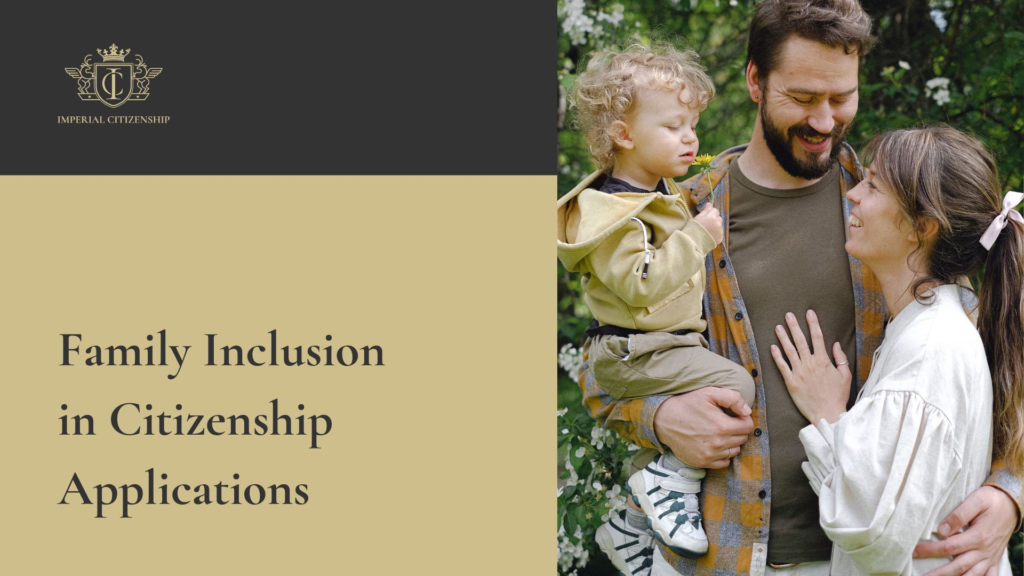
An often-undervalued advantage of citizenship by investment programs is the opportunity to include immediate family members in the application. This is not just about providing your family with a better life; it’s also about securing their future and opening up new opportunities for them.
The inclusion of family members in citizenship applications offers significant benefits, such as the possibility for family members to enjoy benefits including but not limited to international mobility, educational opportunities, and improved healthcare options. However, including family members in citizenship by investment applications necessitates thorough documentation for each dependent and adherence to due diligence processes, which may raise both the overall costs and the processing time for the application.
Extending Opportunities to Loved Ones
Spouses of investors are universally recognized as dependents in citizenship by investment programs, enabling them to obtain better healthcare, educational opportunities, and travel freedom. Some citizenship by investment programs permit the inclusion of future spouses post-citizenship acquisition, as seen in Antigua and Barbuda’s policy, offering flexibility for changing family circumstances.
Securing a Future for Next Generations
Including children in citizenship by investment applications can provide them with access to superior educational systems in different countries. Second citizenships can open a range of professional opportunities for children, often unavailable in their country of origin.
The long-term benefits of citizenship by investment may also include enhanced quality of life, social security, and a stable political environment for future generations. It’s a way of not just improving your life but also securing a better future for your children.
Selecting the Right Citizenship Program
Choosing the appropriate citizenship program is vital, as it will determine the benefits you receive. Applicants must evaluate the investment amount for citizenship programs, which can vary widely, and decide what type of investment aligns with their financial capability, such as a donation, real estate, or alternate investment forms.
The visa-free travel capabilities of a passport are a critical consideration for those who prioritize global mobility and wish to have broad access without visa restrictions. Applicants must also match the residency requirements of a citizenship program, which may range from none to a specific residency period, with their own lifestyle preferences and the quality of life they desire, such as:
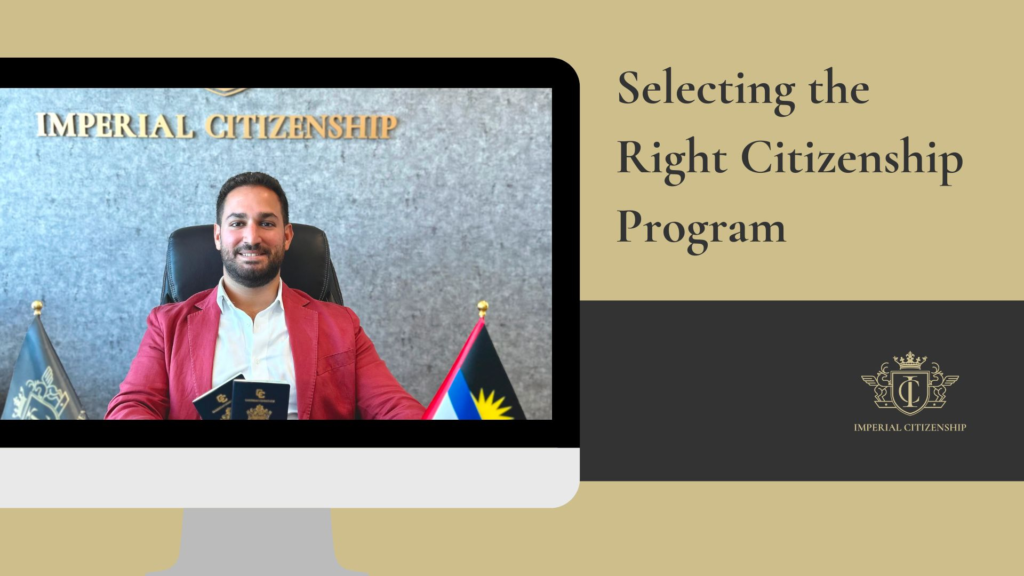
- Safety
- Healthcare
- Education
- Amenities
From Application to Passport: What to Expect
The process of acquiring a second passport, from the moment you decide to embark on this journey until you hold it in your hands, can be an emotional rollercoaster. But with the right guidance and assistance a professional firm like Imperial Citizenship, it can be a smooth and rewarding journey. Competent experts assist applicants through the application process and help resolve any issues that may arise.
The timeline to citizenship can range from a fast track of 3 to 6 months, as in the case of the Vanuatu Citizenship by Investment Program, to between 15 and 18 months for Malta’s citizenship by investment.
The Best Citizenship by Investment Programs for 2024
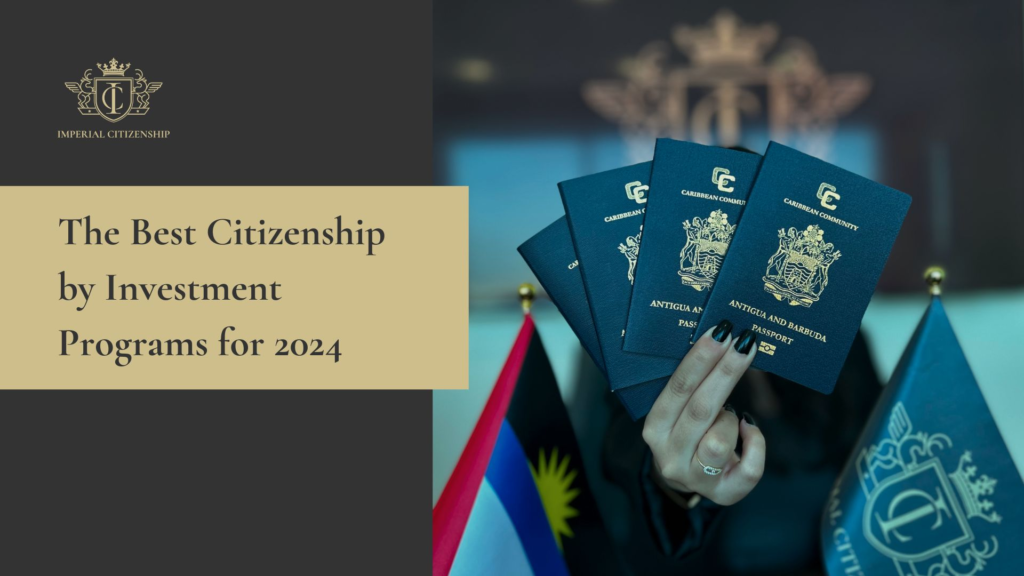
Looking ahead, it’s evident that certain citizenship by investment programs are more prominent than others. Malta, Austria, St. Kitts and Nevis and Antigua and Barbuda have been ranked as the top Citizenship by Investment programs of 2024, with Malta retaining its position for the ninth consecutive year due to its high visa-free access.
Emerging CBI programs in countries like Vanuatu, and North Macedonia represent an attractive alternative citizenship and are increasingly being noticed for their market competitiveness. Whether you’re looking for an affordable and accessible Caribbean passport or an investment in the lifestyle and mobility offered by a European citizenship, there’s a program out there that’s perfect for you.
Legal Considerations and International Law
Navigating the acquisition of a second passport through citizenship by investment programs involves a complex interplay of legal considerations and international law, each carrying its own set of challenges and requirements. These programs are often scrutinized under international law, and potential investors must be aware of the evolving legal landscape that governs these initiatives.
Here are some critical aspects to consider when engaging in citizenship by investment programs:
- Compliance with International Standards: Citizenship by investment programs must adhere to international standards to prevent misuse. This includes thorough due diligence processes to vet applicants, ensuring they do not pose a threat to public safety or are involved in criminal activities.
- Transparency and Accountability: There is a growing demand for transparency in how these programs are managed. Countries offering these programs are expected to maintain clear records and provide accountability on how funds generated from these investments are utilized, especially when directed towards national development projects.
- Legal Obligations and Rights: Investors must understand the legal rights and obligations that come with new citizenship, including tax responsibilities, dual citizenship legality, and adherence to both home and host country laws.
- Potential Changes in Legislation: International pressure and scrutiny may lead countries to alter or tighten regulations surrounding their citizenship by investment programs. Changes can include increased investment requirements, stricter due diligence checks, or more stringent residency requirements.
- Impact on Home Country: Obtaining a second citizenship can have implications for one’s status in their home country. Some countries do not recognize dual citizenship, which might require individuals to renounce their original nationality, impacting their rights and status in their home country.
Understanding and navigating these legal complexities is not only crucial for compliance but also for ensuring that the investment aligns with the investor’s long-term personal and professional goals. Engaging with experts who specialize in citizenship by investment programs can provide invaluable guidance, ensuring that all legal criteria are met and helping to secure a smooth and lawful transition to dual citizenship.
Compliance with Global Standards
Citizenship by investment programs extend beyond just economic benefits for both the individual and the host country; they also encompass legal considerations and international law. Firms like Imperial Citizenship are instrumental in designing citizenship by investment programs that maintain high standards of legal clarity, reputation, and transparency.
International organizations like the Financial Action Task Force (FATF) offer guidance on financial audits and due diligence procedures to ensure citizenship by investment programs meet anti-money laundering standards. Despite structured measures, citizenship by investment programs can face challenges in fully aligning with international standards, highlighting the need for continuous regulatory vigilance.
Summary
We’ve taken a deep dive into the world of Citizenship by Investment (CBI), exploring its benefits, eligibility criteria, investment routes, and the legal considerations involved. From Caribbean islands to the heart of Europe, the path to a second passport is paved with opportunities for personal and financial growth.
The journey to acquiring a second passport is not without its challenges, but with careful planning and professional guidance, these challenges can be successfully navigated. Whether it’s about expanding your business horizons, providing a better life for your family, or simply broadening your personal perspective, a second passport can be a game-changer. The world truly is your oyster with Citizenship by Investment.
Frequently Asked Questions
What is Citizenship by Investment?
Citizenship by Investment (CBI) is a program that offers individuals the opportunity to obtain citizenship by making a substantial financial contribution to a country. It provides a legal pathway for acquiring a second citizenship through financial investment.
What are the benefits of having a second citizenship?
Having a second citizenship can provide benefits such as increased travel freedom, business opportunities, and an improved quality of life, along with tax advantages and access to better healthcare and education for your family. Consider exploring the potential advantages for your situation.
What are the investment routes to a second passport?
Investment routes to a second passport include citizenship by investment programs with varying investment levels, such as direct financial contributions or investments in real estate or businesses. It’s important to research and understand the requirements of each program before deciding.
Who qualifies for Citizenship by Investment?
To qualify for citizenship by investment, applicants must be 18 years of age or older, have a clear background, and be financially capable of funding the investment requirements of the program. This ensures that the applicants meet the basic eligibility criteria for the program.
What are the legal considerations involved in Citizenship by Investment?
When considering Citizenship by Investment, it is essential to adhere to international law, ensure program integrity, and navigate legal complexities to comply with global standards.
